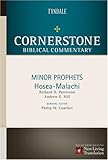The Tyndale New Testament Commentary series is pitched at a level that falls somewhere in the middle between academic and devotional focuses. They are relatively small paperback volumes, but there is enough space for each verse to be covered with at least a couple of paragraphs. Despite its age, IVP are in the process republishing the entire series which is testament to how highly regarded they are.
This volume, covering Colossians and Philemon was written by the prolific author and historian, N T Wright in 1986. The thing that immediately stands out is his engaging writing style. There are few commentators who have such a way with words. Although the Tyndale Series is primarily intended to be exegetical rather than expositional, Wright has a knack of drawing out penetrating insights and points of application with a remarkable economy of words (e.g. on Col 3:20-21 "Children need discipline; so do parents.").
I read this commentary at the same time as working through Douglas Moo’s much larger and more technical commentary on Colossians and Philemon. Many of the points made are of course very similar, but Wright does bring a fresh perspective to most subjects he looks at, and this commentary is no exception.
He argues that the false teaching Paul opposes in Colosse was actually simply Judaism, which is a minority view amongst evangelical commentators. He does a good job of showing how this holds together, although I was not entirely convinced. He views the main emphasis of the letter as a call to maturity, and agrees with O’Brien that we can view Paul as the author.
Some of the concepts I found helpful in his commentary on Colossians were his emphasis on the "new Genesis", and "new Exodus" that Christ represents, as well as his explanation of the significance of baptism as a transition from old to new "solidarities". Wright spends considerable time analysing the poem of Col 1:15-20, which he views as presenting Christ as God’s Wisdom, his Torah.
On Col 3:6 Wright explains his conception of hell as a place where people become less and less human, until the image of God is obliterated in them, but rejects the suggestion that hell does not exist, or that it will be unpopulated.
His commentary on Philemon is equally strong. He draws out fellowship (koinonia) as the key theme of the letter. His best material is on the parallels between Paul’s work of reconciling Philemon and Onesimus, and Christ’s reconciling work in the gospel:
Here, at the climax of the letter, we witness nothing less than the radical application of the doctrine of justification to everyday living. No Christian has a right to refuse a welcome to one whom God has welcomed. Faith in Christ, the basis of justification, is the basis also of koinonia. … Onesimus’ debts are to be put in the ledger under Paul’s name: and there they will find that they are more than cancelled out. They disappear as totally as the sins placed to Christ’s account on the cross.
So I highly recommend this commentary to anyone wanting to study or preach from Colossians or Philemon. It is hard to imagine you could read it without benefit, even if you had access to some of the more in depth commentaries such as those by O’Brien or Moo.





